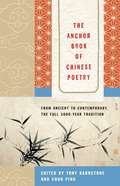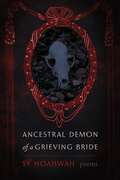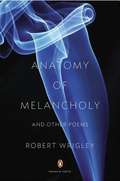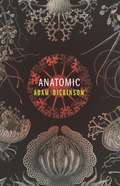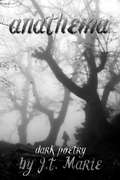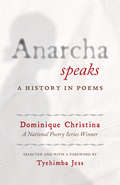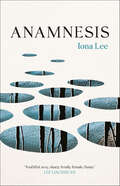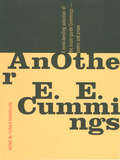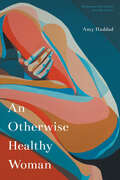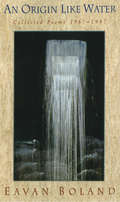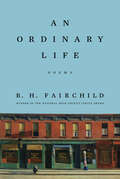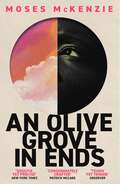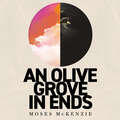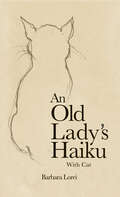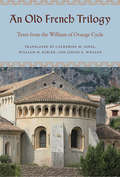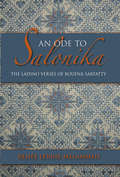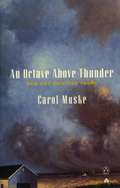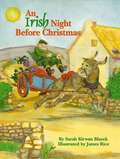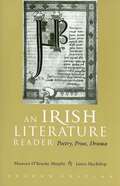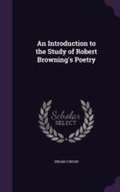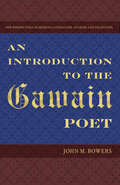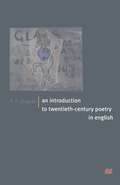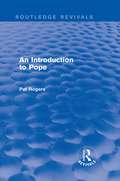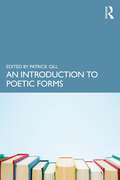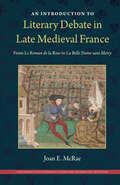- Table View
- List View
Anchor Book of Chinese Poetry
by Tony Barnstone Chou PingUnmatched in scope and literary quality,The Anchor Book of Chinese Poetryspans three thousand years, bringing together more than six hundred poems by more than one hundred thirty poets, in translations–many new and exclusive to the book–by an array of distinguished translators. Here is the grand sweep of Chinese poetry, from theBook of Songs–ancient folk songs said to have been collected by Confucius himself–and Laozi’sDao De Jingto the vividly pictorial verse of Wang Wei, the romanticism of Li Po, the technical brilliance of Tu Fu, and all the way up to the twentieth-century poetry of Mao Zedong and the post—Cultural Revolution verse of the Misty poets. Encompassing the spiritual, philosophical, political, mystical, and erotic strains that have emerged over millennia, this broadly representative selection also includes a preface on the art of translation, a general introduction to Chinese poetic form, biographical headnotes for each of the poets, and concise essays on the dynasties that structure the book. A landmark anthology,The Anchor Book of Chinese Poetrycaptures with impressive range and depth the essence of China’s illustrious poetic tradition.
Ancestral Demon of a Grieving Bride: Poems (Mary Burritt Christiansen Poetry Series)
by Sy HoahwahFractured storytelling for a fractured world, Ancestral Demon of a Grieving Bride draws readers into a world that appears eerily familiar but unsettling as well. Fierce, visceral, sometimes funny, and wholly original, Hoahwah&’s poems will linger in a reader&’s dreams long after she&’s closed the book.
Anatomy of Melancholy and Other Poems
by Robert WrigleyA powerful new collection from an award-winning poet Robert Wrigley has become one of his generation's most accomplished poets, renowned for his irony, power, and lucid style and for his ability to fuse narrative and lyrical impulses. Like its namesake--Robert Burton's seventeenth-century examination of human thoughts and emotions--Wrigley's new collection means to examine our world through the lens of melancholia. From imagined war memorials to insomniac chickens; from Descartes' lost daughter to a dreaming tree; from King Kong to Rush Limbaugh; and from Anna Karenina to a man named Lucy Doolin (short for Lucifer), these are poems that elegize and celebrate that most beautiful, exasperating, joyous, miserable, and perfectly imperfect of all creatures--the human being.
Anatomic
by Adam Dickinson<P>The poems of Anatomic have emerged from biomonitoring and microbiome testing on the author's body to examine the way the outside writes the inside, whether we like it or not. Adam Dickinson drew blood, collected urine, swabbed bacteria, and tested his feces to measure the precise chemical and microbial diversity of his body. To his horror, he discovered that our "petroculture" has infiltrated our very bodies with pesticides, flame retardants, and other substances. He discovered shifting communities of microbes that reflect his dependence on the sugar, salt, and fat of the Western diet, and he discovered how we rely on nonhuman organisms to make us human, to regulate our moods and personalities. <P>Structured like the hormones some of these synthetic chemicals mimic in our bodies, this sequence of poems links the author’s biographical details (diet, lifestyle, geography) with historical details (spills, poisonings, military applications) to show how permeable our bodies are to the environment. As Dickinson becomes obsessed with limiting the rampant contamination of his own biochemistry, he turns this chemical-microbial autobiography into an anxious plea for us to consider what we’re doing to our world -- and to our own bodies.
Anathema
by J. T. MarieChapbook of dark poems about vampires, aliens, angels, demons, monsters, diseases, villains, rogues, and the sea. The bulk of these were written during my years as an undergraduate student at George Mason University, in Fairfax, Virginia, and represent some of my favorite themes: death, lost love, the ocean, alienation, and (odd as it may seem) disease.
Anarcha Speaks: A History in Poems
by Tyehimba Jess Dominique ChristinaThe reimagined story of Anarcha, an enslaved Black woman, subjected to medical experiments by Dr. Marion Sims. Selected by Tyehimba Jess as a National Poetry Series winner.In this provocative collection by award-winning poet and artist Dominique Christina, the historical life of Anarcha is personally reenvisioned. Anarcha was an enslaved Black woman who endured experimentation and torture at the hands of Dr. Marion Sims, more commonly known as the father of modern gynecology. Christina enables Anarcha to tell her story without being relegated to the margins of history, as a footnote to Dr. Sims's life. These poems are a reckoning, a resurrection, and a proper way to remember Anarcha ... and grieve her.
Anamnesis
by Iona LeeIona Lee’s debut collection charts the journey of the writer, artist and performer into adulthood. Written in a unique voice, Iona playfully toys with thematic devices in this entertaining exploration of art and artifice, absence and impermanence, truth and tale telling. Characterised by a deep love of language, its music and its magic, these poems reflect on memory, the future and other hauntings. Wittily observed, this collection is an attempt to connect the stars into tidy constellations, and to join the tiny, inchoate dots of self into something traceable and translatable. Humorous and self-aware, gentle and philosophical, Anamnesis is written in the knowledge that in telling one’s life-story, one creates it.
AnOther E.E. Cummings
by E. E. Cummings Richard Kostelanetz<P>An eye-opening selection of Cumming's more avant-garde poetry and prose. <P>As a poet, Cummings was a pioneer not only in linguistic and typographic inventions, but also in sound and concrete poetry. But his prose is no less experimental; he wrote memoirs, essays, and fiction that are constantly provocative and often radically experimental. <P>To read the avant-garde Cummings is to read a writer who consistently broke with established norms, "never to rest and never to have: only to grow." To not read the avant-garde Cummings is to not read Cummings. <P>Adjusting type size may change line breaks. Landscape mode may help to preserve line breaks.
An Otherwise Healthy Woman (The Backwaters Prize in Poetry Honorable Mention)
by Amy HaddadThe poems in An Otherwise Healthy Woman delve into the complexity of modern health care, illness, and healing, offering an alternative narrative to heroics and miracles. Drawing on Amy Haddad&’s firsthand experiences as a nurse and patient, the poems in this collection teach us to take a moment to stop and acknowledge the longing for compassion in each of us, what ought to be the immediate human response to suffering. The poet isn&’t afraid to explore her own fears and failures or to find joy and humor in the many roles women play. An Otherwise Healthy Woman presents the intimate experiences of a nurse, the vulnerable perspective of a patient, and the lessons of caring for family.
An Origin Like Water: Collected Poems 1957-1987
by Eavan Boland"Readers of this work will recognize and relish the way this collection charts a life's course."--Publishers Weekly Here, from one of our major poets, is the collected early work that has been long unavailable in this country. Included in this volume is the work from Eavan Boland's five early volumes of poetry: New Territory, The War Horse, In Her Own Image, Night Feed, and The Journey. The poems from Boland's first book, New Territory, show her to be, at twenty-two, a master of formal verse reflecting Irish history and myth. This collection charts the ways in which Boland's work breaks from poetic tradition, honors it, and reinvents it. Poems like "Anorexic," "Mastectomy," and "Witching" have an intensity reminiscent of Sylvia Plath and Anne Sexton. In later poems, her subjects become more personal, sequencing Boland's life as a woman, poet, and mother. Boland writes, "I grew to understand the Irish poetic tradition only when I went into exile with it," becoming, in effect, "a displaced person / in a pastoral chaos." This collection demonstrates how Boland's mature voice developed from the poetics of inner exile into a subtle, flexible idiom uniquely her own.
An Ordinary Life: Poems
by B. H. FairchildA poet whose work is “a cause of celebration” (John Freeman, Boston Globe) reveals the extraordinary within the ordinary. In this stirring volume, award-winning poet B. H. Fairchild seeks the ironic, haunting presence imbuing each ordinary life with beauty, power, and meaning. By turns polyphonic and deeply personal, these poems range from Kansas highways and sunbaked baseball fields to secondhand memories of a World War II foxhole. They zoom in on a welder’s truck, a Walmart on Black Friday, and a record store, where a chance encounter offers radiant kindness in the face of grief. In a suite of prose poems written in the returning persona of the machinist and philosopher Roy Eldridge Garcia, “a watcher of things,” Fairchild finds sacred meaning in domestic scenes and expansive imagined narratives. Throughout, the poet evokes the brutal beauty of the American heartland, a morning’s “sheet-metal sky” and a grandfather’s farm, with its “dusty creek, damp / only when the winter wheat was bogged / in snow.” Elevating blue-collar work and scenes from small towns in clear-eyed, reverent poetry, Fairchild proves himself once again “the American voice at its best: confident and conflicted, celebratory and melancholic” (New York Times).
An Olive Grove in Ends: The dazzling debut novel about love, faith and community, by an electrifying new voice
by Moses McKenzie*** ONE OF THE OBSERVER'S 10 MUST-READ DEBUT NOVELISTS OF 2022 ***'A rare glimpse into the harsh realities of street life and love in luminous prose, rendered with sensitivity and without sentimentalism. An astonishing debut' Cherie Jones, author of HOW THE ONE-ARMED SISTER SWEEPS HER HOUSESayon Hughes, a young Black man from Bristol, dreams of a world far removed from the one in which he was raised. Far removed from the torn slips outside the bookie's, the burnt spoons and the crooked solutions his community embraces; most of all, removed from the Christianity of his uncaring parents and the prejudice of law-makers.Growing up, Sayon found respite from the chaos of his environment in the love and loyalty of his brother-in-arms, Cuba; in the example of his cousin Hakim, a man once known as the most infamous drug-dealer in their neighbourhood, now a proselytising Muslim; and in the tenderness of his girl, Shona, whose own sense of purpose galvanises Sayon's. In return, Sayon wants to give the people he loves the world: a house atop a grand hill in the most affluent area of the city, a home in which they can forever find joy and safety. But after an altercation in which a boy is killed, Sayon finds his loyalties torn and his dream of a better life in peril.MORE PRAISE FOR AN OLIVE GROVE IN ENDS:'A remarkable debut, bristling with sharp prose and daring originality' Nathan Harris, author of THE SWEETNESS OF WATER'A phenomenally good novel, tense and thrilling and complex, with breath-stealing moments on every page' Donal Ryan, author of STRANGE FLOWERS'This consummately crafted work can only be a harbinger of a stellar and truly significant career. I urge you to read it' Patrick McCabe, author of THE BUTCHER BOY'Engrossing . . . A tough yet tender story of faith and friendship' OBSERVER
An Olive Grove in Ends: The dazzling debut novel about love, faith and community, by an electrifying new voice
by Moses McKenzieONE OF THE OBSERVER'S 10 MUST-READ DEBUT NOVELISTS OF 2022SOHO HOUSE BREAKTHROUGH WRITER AWARD 2022 WINNER'A rare glimpse into the harsh realities of street life and love in luminous prose, rendered with sensitivity and without sentimentalism. An astonishing debut' Cherie Jones, author of HOW THE ONE-ARMED SISTER SWEEPS HER HOUSESayon Hughes, a young Black man from Bristol, dreams of a world far removed from the one in which he was raised. Far removed from the torn slips outside the bookie's, the burnt spoons and the crooked solutions his community embraces; most of all, removed from the Christianity of his uncaring parents and the prejudice of law-makers.Growing up, Sayon found respite from the chaos of his environment in the love and loyalty of his brother-in-arms, Cuba; in the example of his cousin Hakim, a man once known as the most infamous drug-dealer in their neighbourhood, now a proselytising Muslim; and in the tenderness of his girl, Shona, whose own sense of purpose galvanises Sayon's. In return, Sayon wants to give the people he loves the world: a house atop a grand hill in the most affluent area of the city, a home in which they can forever find joy and safety. But after an altercation in which a boy is killed, Sayon finds his loyalties torn and his dream of a better life in peril.MORE PRAISE FOR AN OLIVE GROVE IN ENDS:'Announcing the arrival of a promising 23-year-old author whose work is wise beyond his years' GUARDIAN'A remarkable debut, bristling with sharp prose and daring originality' Nathan Harris, author of THE SWEETNESS OF WATER'A phenomenally good novel, tense and thrilling and complex, with breath-stealing moments on every page' Donal Ryan, author of THE SPINNING HEART'This consummately crafted work can only be a harbinger of a stellar and truly significant career. I urge you to read it' Patrick McCabe, author of THE BUTCHER BOY'Engrossing . . . A tough yet tender story of faith and friendship' OBSERVER
An Old Lady’s Haiku with Cat
by Barbara LoreiAt this point in my life, I&’m committed to my work, driven by a deep desire to communicate and explore the many mysteries around us. In a time when it&’s more urgent than ever to care for nature and one another, I create not just to please, but to provoke – to gently pause others in their tracks, inviting them to experience the profound, the playful, and perhaps to leave a little bit changed.My art and haiku often draw on mythology, religion, nature, and personal memories. In this way, I see myself as a storyteller, hoping to intrigue anyone who takes a moment to stop and look.
An Old French Trilogy: Texts from the William of Orange Cycle
by William W. Kibler Catherine M. Jones Logan E. WhalenWhile most English-language readers are familiar with Old French epic poetry, or chansons de geste, through the Song of Roland and its tale of gallant martyrdom, this volume provides a broader and richer view of the tradition by introducing songs devoted to the exploits of a different sort of hero—the brave and blustery William of Orange. An Old French Trilogy provides an updated English translation of three central poems from the twelfth-century Guillaume d’Orange cycle. In The Coronation of Louis, the hero saves both king and pope from would-be usurpers and earns the nickname “Short-Nosed William” after a fierce, disfiguring battle with a Saracen giant. In A Convoy to Nîmes and The Conquest of Orange, William conquers two important cities and wins the love of the Saracen Queen Orable. Tremendously popular in the Middle Ages, these works stand the test of time, and the accessible translations capture the sense of the original Old French decasyllabic verse without attempting to preserve or imitate its formal properties. The introduction to the volume discusses literary devices and motifs; historical context; issues of religious conflict, otherness, and gender roles; and themes such as loyalty and courage.
An Ode to Salonika: The Ladino Verses of Bouena Sarfatty
by Renée Levine MelammedThrough the poetry of Bouena Sarfatty (1916-1997), An Ode to Salonika sketches the life and demise of the Sephardi Jewish community that once flourished in this Greek crossroads city. A resident of Salonika who survived the Holocaust as a partisan and later settled in Canada, Sarfatty preserved the traditions and memories of this diverse and thriving Sephardi community in some 500 Ladino poems known as coplas. The coplas also describe the traumas the community faced under German occupation before the Nazis deported its Jewish residents to Auschwitz. The coplas in Ladino and in Renée Levine Melammed's English translation are framed by chapters that trace the history of the Sephardi community in Salonika and provide context for the poems. This unique and moving source provides a rare entrée into a once vibrant world now lost.
An Octave above Thunder
by Carol MuskeAn Octave Above Thunder presents a collection of poems spanning more than twenty years in the career of Carol Muske, who has won acclaim for work which marries sophisticated intelligence, emotional resonance, and technical craft. What most distinguishes Carol Muske's poetry is her awareness of the complicated web into which the personal and the political, the familial and the feminist, are woven. Filled with audible contemplation-invocation, echo, dreamsong, dirge-Muske's lyrical precision, assured touch, and exacting clarity make her one of the most talented poets of her generation. .
An Irish Night Before Christmas
by Sarah Kirwan Blazek'Round Christmastime, things are a little different on the Emerald Isle. Instead of logs thrown onto the fire, we find turf blazing bright. Instead of cold eggnog spiced just right, the mother and father are enjoying their stout. You'll find no Donner or Cupid or Blitzen, but Ould Neddy the donkey and his small cart. Father Christmas with his Irish eyes twinkling ushers in his seven elves, and thus begins the wondrous Irish Night Before Christmas. This humorous tale, in the same vein as the famous Cajun Night Before Christmas, is the Irish version of Father Christmas's yearly visit. Told in delightful brogue, it will have everyone wishing "Nollaig sona agut!" (Merry Christmas to you!)
An Irish Literature Reader: Poetry, Prose, Drama, Second Edition
by James MacKillop Maureen O'Rourke MurphyIn a volume that has become a standard text in Irish studies and serves as a course-friendly alternative to the Field Day anthology, editors Maureen O’Rourke Murphy and James MacKillop survey thirteen centuries of Irish literature, including Old Irish epic and lyric poetry, Irish folksongs, and drama. For each author the editors provide a biographical sketch, a brief discussion of how his or her selections relate to a larger body of work, and a selected bibliography. In addition, this new volume includes a larger sampling of women writers.
An Introduction to the Gawain Poet (New Perspectives on Medieval Literature: Authors and Traditions)
by John M BowersIn An Introduction to the Gawain Poet, John Bowers surveys an expanded selection of the works of Chaucer's anonymous contemporary, considering Sir Gawain and the Green Knight alongside the poet's lesser known but no less brilliant works.In addition to his succinct introductions and plot summaries, Bowers skillfully details the cultural, historical, political, and religious contexts for these works, synthesizing them with close reading of selected passages. Perhaps his most exciting contribution to the field is his choice to historicize the poet's life and works in the context of the royal culture of King Richard II, boldly contending that it was highly possible the Gawain Poet was a frequent visitor to Richard's court in London. The final chapter surveys the works influenced by, as well as the influences reflected in, the poet's work, from the Bible to The Lord of the Rings. The attention Bowers pays to the critical tradition that has developed around these texts over the past hundred years makes An Introduction to the Gawain Poet an ideal volume for both undergraduate students and scholars of the Gawain Poet. Bowers has marshaled his formidable skills to create a book impressive in its balanced combination of breadth and depth.
An Introduction to Twentieth-Century Poetry in English
by R. P. DraperThis critical survey of modern poetry from Thomas Hardy to Seamus Heaney considers both the self-consciously revolutionary innovations of Modernism and more traditional developments, taking fully into account the extent to which 'English' can no longer be equated solely with England. Scots, Welsh and Irish poetry, and poetry from Commonwealth countries such as Australia, New Zealand and the Caribbean, are recognised as equally important aspects of the diversity that characterises modern poetry in English; and, in particular, the contributions of North American poets such as Ezra Pound, William Carlos Williams, Wallace Stevens and Robert Lowell receive the major emphasis that their achievement and extensive influence warrants and attention is given to important new perspectives in the work of women poets such as Adrienne Rich, Sylvia Plath and Elizabeth Bishop.
An Introduction to Pope (Routledge Revivals)
by Pat RogersIn this concise introduction to Pope’s life and work, first published in 1975, the poet’s highly successful career as a man of letters is seen against the background of the Augustan age as a whole. Pat Rogers begins by examining the relationship of the eighteenth-century writer to his audience, and discusses the role of style and versification in this. The book covers the whole of Pope’s work and includes not only the translations of Homer and such minor poems as The Temple of Fame, but also the prose, both drama and correspondence. Based on extensive research, this book will provide literature students with a greater appreciation and understanding of Pope’s verse and the ways in which he addressed his eighteenth-century context in his work.
An Introduction to Poetic Forms
by Patrick GillAn Introduction to Poetic Forms offers specimen discussions of poems through the lens of form. While each of its chapters does provide a standard definition of the form in question in its opening paragraphs, their main objective is to provide readings of specific examples to illustrate how individual poets have deviated from or subverted those expectations usually associated with the form under discussion. While providing the most vital information on the most widely taught forms of poetry, then, this collection will very quickly demonstrate that counting syllables and naming rhyme schemes is not the be-all and end-all of poetic form. Instead, each chapter will contain cross-references to other literary forms and periods as well as make clear the importance of the respective form to the culture at large: be it the democratising communicative power of the ballad or the objectifying male gaze of the blazon and resistance to same in the contreblazon – the efficacy of form is explored in the fullness of its cultural dimensions. In using standard definitions only as a starting point and instead focusing on lively debates around the cultural impact of poetic form, the textbook helps students and instructors to see poetic forms not as a static and lifeless affair but as living, breathing testament to the ongoing evolution of cultural debates. In the final analysis, the book is interested in showing the complexities and contradictions inherent in the very nature of literary form itself: how each concrete example deviates from the standard template while at the same time employing it as a foil to generate meaning.
An Introduction to Literary Debate in Late Medieval France: From <i>Le Roman de la Rose</i> to <i>La Belle Dame sans Mercy</i> (New Perspectives on Medieval Literature: Authors and Traditions)
by Joan E. McRaeHow medieval poems sparked discussions on women’s agency, love, marriage, and honor that prefigured modern feminism This volume immerses readers in a debate tradition that flourished in France during the late Middle Ages, focusing on two works that were both popular and controversial in their time: Le Roman de la Rose by thirteenth-century poets Guillaume de Lorris and Jean de Meun and La Belle Dame sans Mercy by fifteenth-century royal secretary and poet Alain Chartier. This is the first comparative volume on these important works and the discussions they sparked. Engaging with questions of women’s agency, love, marriage, and honor, these two poems prompted responses that circulated via treatises, letters, and sermons among officials, clerics, and poets. Joan McRae provides commentary on the two texts, a timeline and summary of the resulting debates, and biographical sketches of the leading intellectuals who matched wits over different ways of reading the texts, including pioneering writer Christine de Pizan. McRae shows that these works and the debates, read together, consider a range of social issues that raise questions of gender, the place of power and hierarchy in societal relationships, and the responsibility of writers for the effect of their works on readers. An Introduction to Literary Debate in Late Medieval France is a helpful overview of these weighty arguments for both students and scholars. McRae provides a compact, comprehensive, and up-to-date study, spotlighting influential literary expressions that evolved into the “querelle des femmes,” the “woman question,” which in turn paved the way for modern feminism. A volume in the series New Perspectives on Medieval Literature: Authors and Traditions, edited by R. Barton Palmer and Tison Pugh
